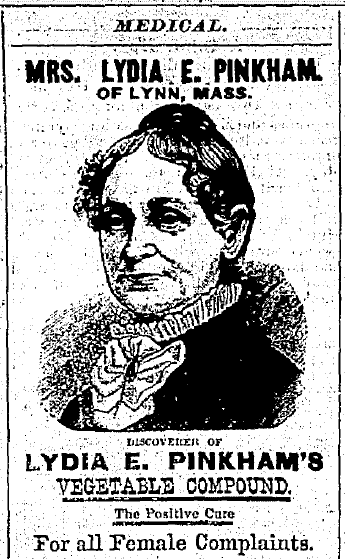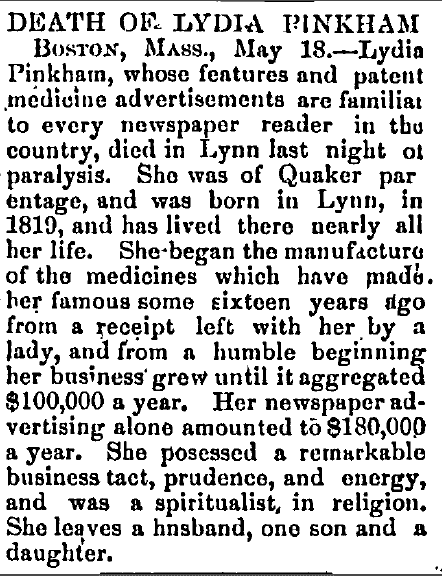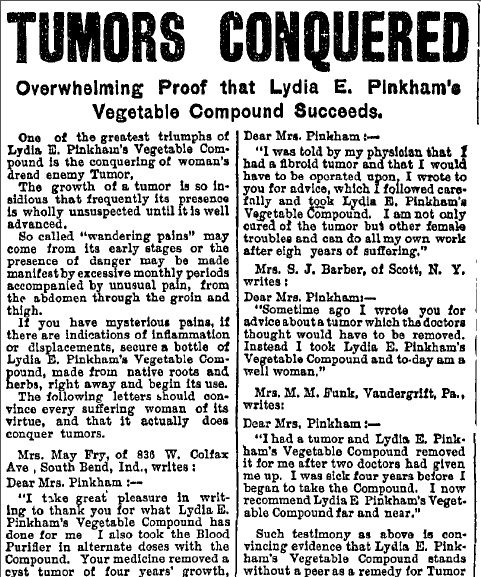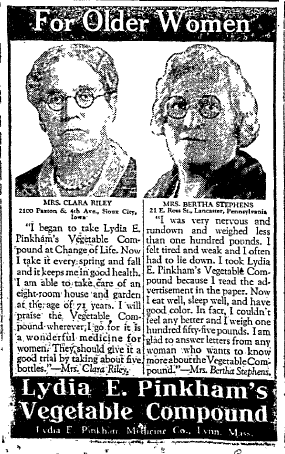Introduction: In this article, Gena Philibert-Ortega researches old newspaper articles and advertisements to show how, more than a century ago, Lydia Estes Pinkham used marketing techniques to promote her medicinal “vegetable compound” that may inspire today’s businesses. Gena is a genealogist and author of the book “From the Family Kitchen.”
Looking for marketing ideas for your business? You may want to take a look at old newspapers for inspiration.
Consider the work of Lydia Estes Pinkham.

Who Is Lydia Pinkham?
Who is Lydia Pinkham you ask? She was a wife and mother living in Lynn, Massachusetts, when the Depression of 1873 threatened to ruin her family financially. Lydia had a recipe for a medicinal elixir that she had previously shared with family and friends. She started manufacturing and bottling this “medicine” in an effort to better her family’s financial position.
Faces Sell
Lydia Pinkham was a master marketer. Her marketing plan included placing an image of herself on her product’s bottles. By putting her face on the label she established a credibility with her target audience, women. She had several medicines; her vegetable compound was likely the most popular and had an alcohol content that was as high as 20%.[ii] At a time where visiting a physician was expensive and women suffered in silence through a variety of ailments—or ingested medicines that had deadly ingredients—Pinkham’s medicine provided some hope.
Customer Testimonials
Lydia also produced pamphlets, which were really thinly disguised recipe books, which not only gave suggestions of what products a woman should use but provided women’s own stories of being cured. In the pamphlet titled Food and Health, there are numerous testimonials that include women’s names and addresses. The pamphlet says of these testimonials: “…you will find letters from many classes of women, young and old, mother and daughter. They are genuine expressions of gratitude from one woman to another.”[iii]

Establish Expertise
Pinkham encouraged her customers to write to her with their health questions. This service became so popular that these letters were being answered years after Pinkham’s death and signed by “Mrs. Pinkham.” When a photo of the gravestone of Lydia Pinkham was published in a 1905 issue of the magazine Ladies’ Home Journal it caused some to question the validity of these letters. Even though Lydia’s 1883 obituary had run in newspapers all around the country, it seems some people believed that Lydia was still answering these letters long after her death. At the end of this 1907 California newspaper article “Mrs. Pinkham” clarifies that she is actually the daughter-in-law of the real Mrs. Lydia Pinkham.

Advertise!
Newspapers ran all kinds of advertisements for Pinkham’s products including those with images and names of women customers singing the product’s praises. Were these women real or just figments of the company’s marketing machine? It appears that they were real women and although they may seem quite personal to us today, these testimonies are really not that different from postings online on medical support group boards, mailing lists, or review websites.

Enjoy Enduring Business Success
Did Lydia’s marketing work? The evidence of her company’s success is that you can still purchase her reformulated products, manufactured by a different company, today. Marketing techniques that Lydia used in the 19th century, including customer testimonials, are still an effective way to spread the news about products in today’s market.
[i] From Food and Health, page 2. Testimonial by Mrs. Mary Dipietro of Canton, Ohio. < http://pds.lib.harvard.edu/pds/view/4089243?n=4&imagesize=1200&jp2Res=.25&printThumbnails=no> Available online in the Lydia Estes Pinkham Collection http://pds.lib.harvard.edu/pds/view/4089243 on the Harvard University Library’s Open Collections Program Women Working, 1800-1930 at http://ocp.hul.harvard.edu/ww/pinkham.html.
[ii] The Name that Launched a Million Bottles. The Annette & Irwin Eskind Biomedical Library, http://www.mc.vanderbilt.edu/biolib/hc/nostrums/pinkham.html.
[iii] From Food and Health. Available online in the Lydia Estes Pinkham Collection http://pds.lib.harvard.edu/pds/view/4089243 on the Harvard University Library’s Open Collections Program Women Working, 1800-1930 at http://ocp.hul.harvard.edu/ww/pinkham.html.
